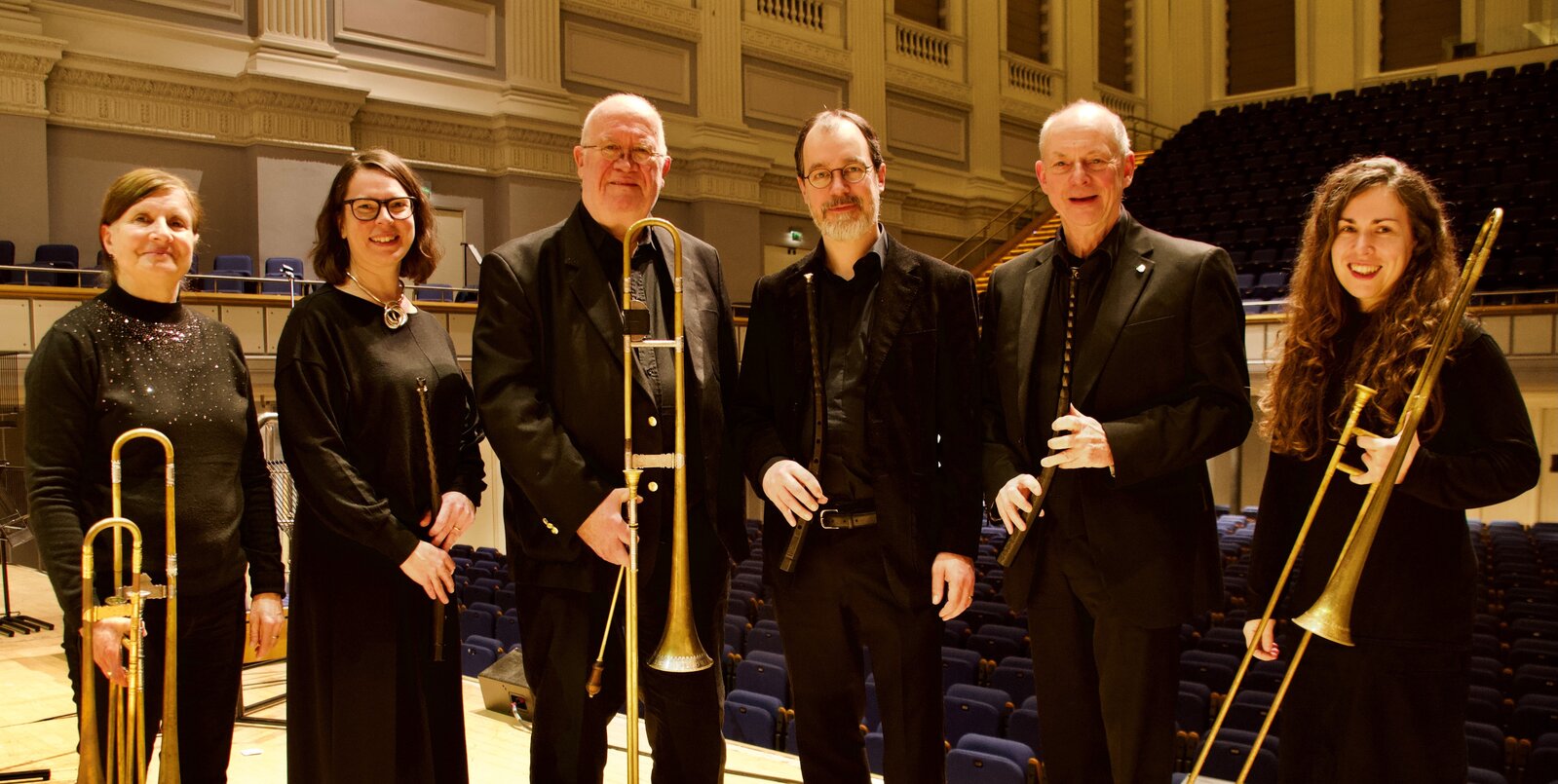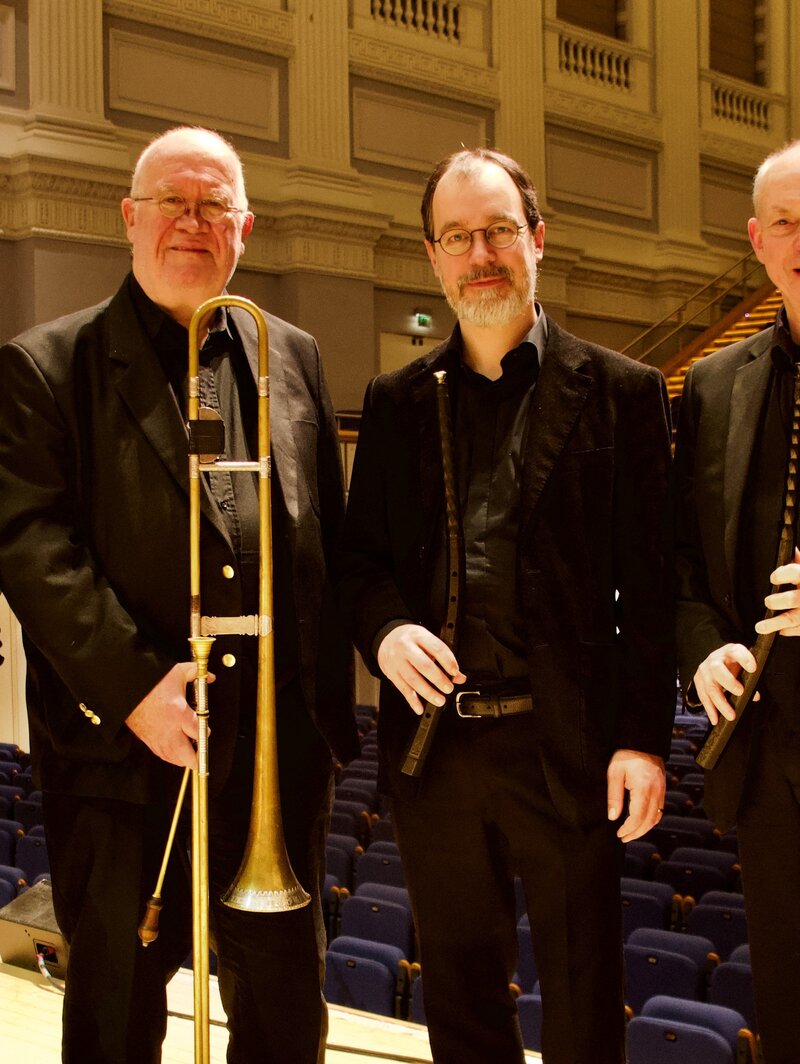His Majestys Sagbutts & Cornetts (UK)


His Majestys Sagbutts & Cornetts (est. 1982) celebrates its 41st birthday in 2023 and continues in the same spirit as always.
Bringing the sound of its noble instruments to the 21st century, through pan-European repertoire from 16th- and 17th-century composers, attracting new audiences via broadcasts, recordings and – best of the lot! – live performances.
The illustrious name of the ensemble is taken from five-part tthings for His Majestys Sagbutts & Cornetts by composer Matthew Locke, probably performed during the 1661 coronation celebrations of King Charles II. HMSC is essentially a recital group, often joining forces with singers and string players and is frequently asked to collaborate with choirs. Recent projects include with Alamire, Magdalena Consort and Fretwork, Ex Cathedra, Magnificat, Dunedin Consort and the Choir of King’s College, Cambridge.
HMSC is invited to give masterclasses and workshops as a part of its educational output. Individual members teach at conservatoires and universities throughout the UK and Europe.
In addition to rediscovering works of the past, expanding contemporary repertoire is an important part of the HMSC mission and legacy. Composed in 2023, Accolade by Howard Skempton (b. 1947) was commissioned by the ensemble for its 40th anniversary season with funds from the Vaughan Williams Foundation. Its world premiere took place on 7th May at Holywell Music Room, Oxford and its European premiere on 24th August at Hofkirche Innsbruck as part of Innsbrucker Festwochen der Alten Musik, later broadcast on Austrian national radio. Extended suite At His Majestys Pleasure (2012) by Martin Harry (b. 1964) was commissioned for the 30th anniversary of HMSC and released on their own record label, SFZ Music. The ensemble has also performed On the Wall, Off the Wall: Six Venetian Sketches for cornetts and sackbuts (2004) by former group keyboardist Timothy Roberts (b. 1953), recorded for Toccata Classics (2022).
Ticket price: 2000 Ft
Programme
First half
Matthew Locke (c. 1621-1677): Pavan-Almand à 6
William Byrd (c. 1540-1623): Rorate coeli à 5
Anthony Holborne (c. 1545-1602): Almand: The Night Watch (organ solo)
John Dowland (1563-1626): A Shepherd in Shade; The Night Watch (reprise)
Anthony Holborne: Galliard: As it fell on a holie Eve; Galliard: Heigh ho holiday
Anonymous (15th c.): Coventry Carol
Samuel Scheidt (1587-1654): Wie Schön leuchtet der Morgenstern (organ solo)
Michael Praetorius (1571-1621) : Quem pastores laudavere
Heinrich Schütz (1585-1672): Ein Kind ist uns geboren
Johann Hermann Schein (1586-1630): Padouan no. 7
Johannes Eccard (1553-1611) and Johann Hermann Schein: Von Himmel hoch, da komm ich herr
Second half
Howard Skempton (b. 1947): Accolade [Commissioned for HMSC's 40th anniversary in 2023]
Claudio Monteverdi (1567-1643): Laudate Dominum in sanctis eius
Giovanni Gabrieli (c. 1554-1612) : Canzone Seconda à 6
Adrian Willaert (c. 1490-1562): O magnum mysterium
Claudio Monteverdi: Confitebor tibi domine
Giovanni Gabrieli: Toccata del secondo tuono (organ solo)
Giovanni Bassano (1560/1-1617): Hodie Christus natus est à 7
Michael Praetorius: Es ist ein Rose entsprungen
The education of an English gentleman in the seventeenth century was not considered complete unless he had undertaken the Grand Tour: a journey of cultural discovery through continental Europe. We begin our own itinerary this evening in England before setting sail across the North Sea to Germany, and finally travelling south to Venice, traditionally the final stop on the Grand Tour, and, fortuitously, the European centre of cornett and sackbut playing par excellence in the sixteenth and seventeenth centuries. We imagine our journey taking place at Christmas, bringing you a flavour of European festive and devotional music-making in all its diversity, presenting vocal and instrumental music dating from the fifteenth to the seventeenth centuries.
Our programme begins with some of Matthew Locke’s surviving music “for his Majestys Sagbutts & Cornetts”, found dispersed across two manuscripts in the British Library and the Fitzwilliam Museum, Cambridge. The British Library autograph of the six-part Pavan-Almand which we will perform this evening includes the note (in a later hand), “composed by Mr Locke for the Restoration of King Charles the 2nd”. It is arguably some of the most famous music written for our instruments, and the inspiration for the modern incarnation of His Majestys Sagbutts and Cornetts, formed in 1982. Many ensembles are celebrating the 400th anniversary of the death of William Byrd this year, and in our contribution to this celebration, the Advent motet Rorate coeli, we combine voice and instruments in Byrd’s contemplative setting of this text. Anthony Holborne and John Dowland, two of England's most famous composers of secular music for instruments from the early seventeenth century, provide pieces on the theme of the Christmas story that we might imagine being heard in royal courts and palaces during the festive season. The anonymous Coventry Carol, believed to originate in a fifteenth century play cycle from the English town of Coventry, sees us on our way to Germany, the second stop on our tour.
Here, we open with three variations on the Lutheran chorale melody Wie schön leuchtet der Morgenstern by Samuel Scheidt, performed on the organ by William Whitehead. Lutheran chorales also feature in our contributions from Michael Praetorius, Johannes Eccard and Johann Hermann Schein this evening, as we explore the varied textures and exciting interplay between voices and instruments afforded by these compositions. All the German composers represented on our programme were profoundly influenced by musical developments in Venice, the fruits of which were taken to Germany by musicians such as Heinrich Schütz, and in honour of this connection we will perform Schütz's Ein Kind ist und geboren from Geistliche Chormusik (1648).
To begin the second half, and in a minor departure from the Christmas theme, we are delighted to be giving a second European performance of the group’s 40th anniversary commission, Accolade, by Howard Skempton. This fabulous canonical composition captures some of the best characteristics of our instruments, with a sweeping melody and instrumental dialogues. We are grateful to the Vaughan Williams Foundation for supporting this commission.
We begin our Italian 'set' with a virtuosic vocal solo by one of Venice's most famous composers, Claudio Monteverdi, giving our wonderful tenor soloist Mark Dobell a chance to shine, followed swiftly by one of our favourite canzonas by Giovanni Gabrieli. Gabrieli was organist and head of the instrumental ensemble at St Mark’s Basilica, and as such he is perhaps the single most important figure in the history of the cornett and sackbut ensemble. Stepping back a generation or two, however, we have chosen the beautiful advent motet O magnum mysterium by Adrian Willaert to punctuate the florid seconda pratica offerings of Monteverdi and Gabrieli, allowing a moment of calm before we return to the joyful Confitebor tibi domine for tenor and two cornetts. William will introduce our final piece with an organ toccata by Gabrieli, before we finish our programme with a lively setting of Hodie Christus natus by one of Venice's lesser-known composers, Giovanni Bassano. Bassano brings us full circle at the end of our concert as he was closely related to the England-based branch of the Bassano family, émigré musicians and instrument makers who worked in the courts and Palaces of London where we began our journey.
We hope you enjoy the auditory delights of our Christmas Grand Tour as much as Thomas Coryate, an English courtier visiting Venice in the early seventeenth century, who, upon hearing the music of the Gabrielis in Venice, wrote:
I heard the best musicke that ever I did in all my life … so good, so delectable, so rare, so admirable, so superexcellent, that it did even ravish and stupifie all those strangers that never heard the like. But how others were affected with it I know not; for mine owne part I can say this, that I was for the time even rapt up with Saint Paul into the third heaven.
Personnel:
Tenor - Mark Dobell
Cornetts - Jamie Savan, Helen Roberts, Jeremy West
Sagbutts - Susan Addison, Stephanie Dyer, Stephen Saunders
Organ - William Whitehead
The revenue generated from the tickets purchased during the Fructus Labiorum Classic Music Festival will be used in its entirety, in cooperation with the Integrated Institution for Family Support and Child Welfare of Veszprém, to provide free tickets to the ice and snow-doughnut rink of the Winter Garden for disadvantaged families in Veszprém and the surrounding area.
In addition to entrance tickets, it will also be possible to buy donation tickets - both online in advance and on the spot.
